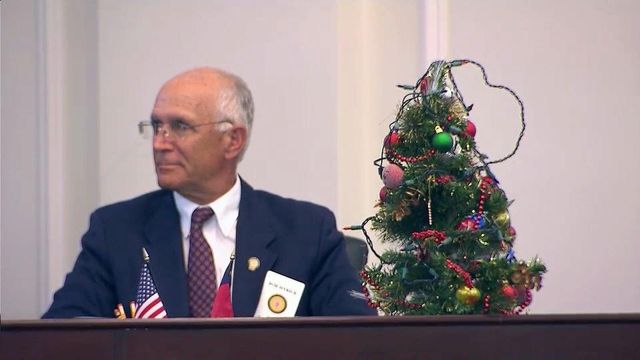Lawmakers negotiating temporary NC spending measure
House and Senate leaders said Thursday they were close to working out a temporary spending measure to keep the government running while they work out a final budget deal.
Posted — Updated"We're this close," Senate President Pro Tem Phil Berger said, holding is thumb and forefinger nearly together in front of his eye. "I feel confident we're going to see something Monday."
Over Berger's shoulder as he stood on the Senate floor, a miniature Christmas tree was propped up on the clerk's desk, a visual joke about the big differences between the House and the Senate on the main budget and how long that could keep lawmakers in session.
"I think they've got a pumpkin on the House side," Berger, R-Rockingham, quipped.
"We cannot move forward with this redistribution formula. I believe it's a disaster," Rep. Becky Carney, D-Mecklenburg, said during a House Finance Committee meeting that highlighted the concerns of nonprofits, private schools and others about the Senate tax plan.
"You just can't kill the goose that lays the golden egg and expect it to keep giving," Rep. Paul Stam, R-Wake, said of the proposal to shift more sales tax money from urban to rural counties.
The Senate plan also would cap deductions for charitable contributions as well as sales tax refunds for nonprofits, including struggling rural hospitals.
"We're looking at taking hospitals that are barely making it and taking them to hospitals that won't be able to make it," said Cody Hand, vice president and deputy general counsel for the North Carolina Hospital Association.
Although corporate and individual tax rates were go down, the proposal would add sales taxes on services such as car repairs and veterinary care.
"These are just things that, it seems to me, are unfair to the middle class and to the average citizen and to the small businesses," said Rep. Paul Luebke, D-Durham.
While forecasts of a December session are hyperbole, it doesn't seem a stretch to suggest lawmakers could be working until after Labor Day. That would be unusual for a part-time citizen legislature that typically tries to adjourn in July.
"We're not leaving until we get a budget. We think that (tax plan) needs to be in the budget," Berger said.
Generally speaking, senators appear to favor a shorter continuing resolution, while House lawmakers favor a longer term. The temporary spending measure could last between two and three months, according to multiple sources, although negotiators were unwilling to disclose an exact timeframe until other details of the CR are worked out.
"I think the major areas of the CR have agreement," House Rules Committee Chairman David Lewis, R-Harnett, said. "Like with many areas of our everyday lives, sometimes the smallest pebbles are the hardest to get our of our shoes."
According to multiple interviews with lawmakers in both chambers, one of those pebbles appears to be questions about how to take care of teacher and teaching assistant funding. In their main budget proposals, House leaders have proposed retaining most of the state's teaching assistants, while senators want to shift funding from TAs to hire more classroom teachers.
"There are differences between the House and Senate in the budget on those issues," Berger said. "I don't want to identify or talk about an specifics as far as the CR is concerned."
The question is far from academic, as school begins around Aug. 25 for traditional-calendar public schools, which may be wondering how they should staff classrooms. For lawmakers working on the continuing resolution, the problem is allowing schools to prepare for the coming year without committing to one course of action over the other.
In fact, cities and counties will likely be watching the action in Raleigh with unease. Unlike lawmakers, city councils and county commissioners cannot put off passing a budget and will have to have their spending plans in place by next Tuesday. That means they will be committing to their annual spending plans before they know exactly how tax and budget changes in Raleigh will affect their work.
Berger, Lewis and others said they expect to be able to adopt their continuing resolution Monday and Tuesday.
Related Topics
• Credits
Copyright 2024 by Capitol Broadcasting Company. All rights reserved. This material may not be published, broadcast, rewritten or redistributed.






